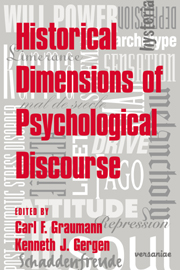Book contents
- Frontmatter
- Contents
- List of contributors
- 1 Psychological discourse in historical context: An introduction
- Part I Disciplining psychological discourse
- Part II History as culture critique
- Part III Early antecedents
- 9 The naturalized female intellect
- 10 Sources of redemption in psychoanalytic developmental psychology
- 11 The historical vicissitudes of mental diseases: Their character and treatment
- 12 Women as mothers and the making of the European mind
- Part IV Lived history
- Author index
- Subject index
10 - Sources of redemption in psychoanalytic developmental psychology
Published online by Cambridge University Press: 20 October 2009
- Frontmatter
- Contents
- List of contributors
- 1 Psychological discourse in historical context: An introduction
- Part I Disciplining psychological discourse
- Part II History as culture critique
- Part III Early antecedents
- 9 The naturalized female intellect
- 10 Sources of redemption in psychoanalytic developmental psychology
- 11 The historical vicissitudes of mental diseases: Their character and treatment
- 12 Women as mothers and the making of the European mind
- Part IV Lived history
- Author index
- Subject index
Summary
As Kenneth Gergen and his colleagues have reminded us, the correspondence of psychological theory with empirical fact is tenuous and problematic. The psychological theories we construct are heavily laced with long-standing concerns, patterns, and images that are not derived from empirical observation. If this is the case, then surely one of the main purposes of a metapsychology is to study psychological theory as a means of illuminating the concerns and values that are most compelling to us as a culture. In exploring the theoretical frameworks currently in use, and the broad cultural lineages from which they are derived, we thus can learn a great deal about ourselves. As cultural documents, contemporary theories of human nature and development may be analyzed in terms of how they embody past and present ways in which we have constructed the dilemmas of existence and attempted to resolve them.
Few themes are more long-standing and pervasive in Judeo-Christian culture areas than that of an anticipated salvation or redemption from the woes and imperfections of human life. It is perhaps not surprising, therefore, that this concern continues to inform the assumptions and aspirations we bring to psychological theory to this day. In this chapter, I explore the persistence of the theme of redemption in psychoanalytic developmental psychology. By “psychoanalytic developmental psychology” I refer to three interrelated psychoanalytic schools or loosely affiliated groups of theorists under the broader umbrella of “psychoanalysis.”
- Type
- Chapter
- Information
- Historical Dimensions of Psychological Discourse , pp. 193 - 203Publisher: Cambridge University PressPrint publication year: 1996
- 1
- Cited by

